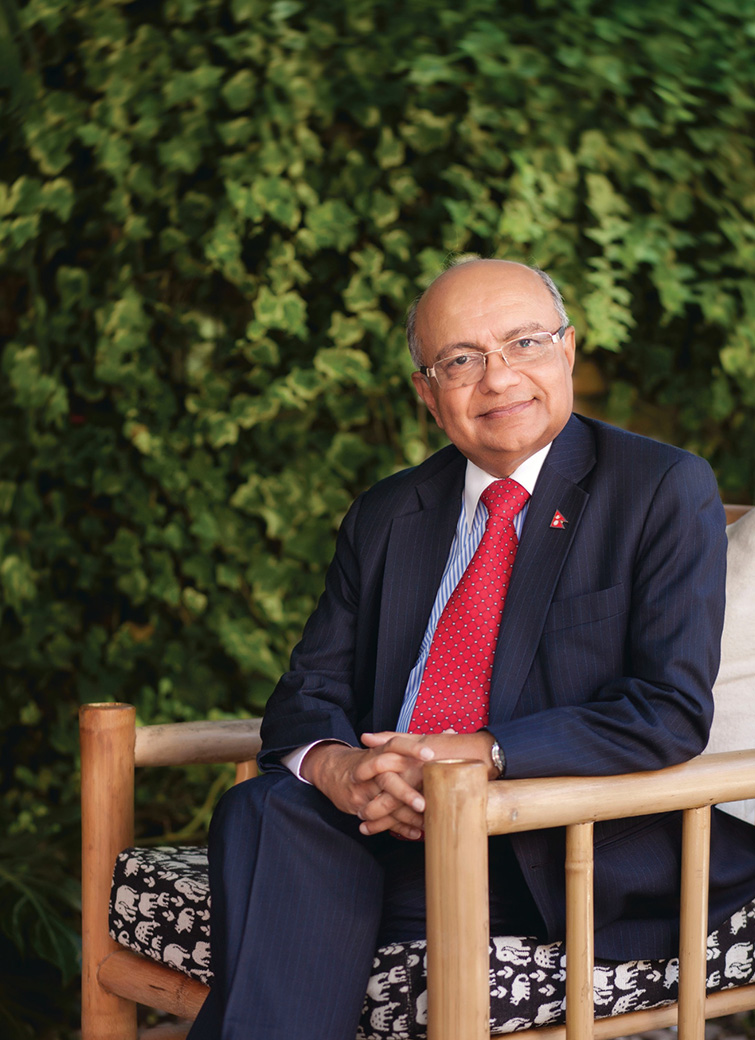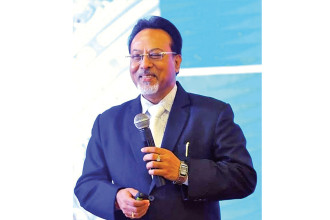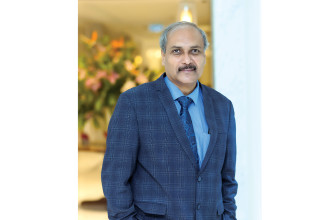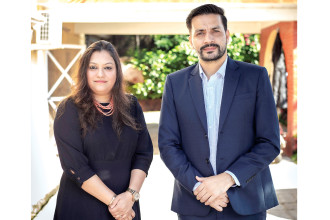
A former Deputy Executive Director of UNICEF and Assistant Secretary General of the United Nations, Kul Chandra Gautam has experienced senior managerial and leadership positions with the UN in several countries and continents in a career spanning over three decades. A renowned diplomat, development professional and a former senior official of the UN, he has broad understanding of international diplomacy, development cooperation and humanitarian assistance.
He is also the author of two books – Lost in Transition and Global Citizen from Gulmi. He is currently engaged with several international and national organisations, charitable foundations and public private partnerships.
In this edition of B360, Kul Chandra Gautam talks about his experience with the UN, the reason for writing his two books, and his thoughts on the current leadership and socio-political situation of Nepal. Excerpts:
Which decisions that you took in your early life do you consider to have opened doors of opportunities for you?
There were several key decisions.
First, it was the decision taken by my grand-father to make me an “educated pundit” that paved the path for my education in a society where there were no educational opportunities in my childhood.
Second, my parents’ determination to educate me beyond the traditional Sanskrit and theological studies to modern “English Education” put me on the right track to modern career aspirations.
Third, my own determination and tenacity to excel in my studies and going beyond normal course work to pursuing many extra-curricular activities, led to opening my mind, being receptive to new ideas, have better understanding of the outside world, and aspire to be a high-achiever in life.
Fourth, the initial denial of a Nepali passport to me for pursuing higher education abroad, despite being an excellent student and getting full scholarship based on merit, made me conscious of the need to fight for justice and not to give up easily, strengthened my determination to be persistent until success is achieved.
Fifth, my anti-Vietnam War activism and leadership during my college years in the US got me interested in the work of the United Nations. Once I joined the UN, its high principles and good work to help the poor and vulnerable motivated me to work hard and succeed.
You have served in senior managerial and leadership positions with the UN in several countries and continents in a career spanning over three decades. Could you sum up your experiences in the UN for our readers?
I worked in many dangerous and difficult duty stations with UNICEF in countries like Cambodia, Laos and Haiti during times of violent conflicts and humanitarian crisis. Though it was personally inconvenient, the opportunity to help the poor and vulnerable women and children in times of great distress gave me a special sense of doing worthwhile duty and satisfaction.
Later in my career, I worked at policy-making and strategy-formulating assignments in Latin America, Asia, Africa and elsewhere that was professionally challenging and very stimulating. A highlight of my career was the opportunity to orchestrate the World Summit for Children in 1990. That was the largest gathering of world leaders in history until that time and I had the extraordinary opportunity to draft their Declaration and Plan of Action in which they committed to pursuing ambitious goals for children and human development that eventually led to the Millennium Development Goals. I feel very proud of having had a modest but meaningful personal role in shaping such important world’s development agenda.
What were the reasons behind writing the books – Lost in Transition and Global Citizen from Gulmi?
Both these books came out of requests by my friends and colleagues encouraging me to share my views and experiences in the form of a memoir. In Lost in Transition, I attempt to analyse why despite great potential and goodwill and support of the international community, Nepal remains mired in poverty and prolonged political transition. The book contains a candid critique of what ails Nepal’s politics and economy, and how we might rebuild the country from the ruins of the prolonged Maoist mayhem and the mega earthquake of 2015. I conclude that Nepal is saturated with too much politics and too little attention to economic development and good governance and the need to reverse this scenario.
What is the message from Global Citizen from Gulmi?
There are multiple messages in the book, some relevant for Nepal and most for the global community. I share my dream for a peaceful and prosperous Nepal, and my vision for a new world order with a revitalised United Nations helping humanity to achieve ambitious sustainable development goals with respect for human rights, equity and social justice as norms rather than exceptions.
For Nepal, my key message is that its prosperity depends heavily on how well we embrace the positive forces of globalisation and global best practices and universal norms of good governance, rule of law, transparency and accountability. It is long past time for Nepal to overcome our obsession with political experiments and focus on economic development and social progress in a pragmatic and non-ideological manner as have other Asian countries that have made rapid progress.
For the global community, I recount how all the promises of human progress require a multilateral approach for sustainable success – whether it is spearheading a global child survival revolution or ensuring a rule-based global trading system; whether it is maintaining international peace and security or tackling global warming and climate change.
In today’s world, national action is necessary but not enough to tackle most problems facing humanity. Global solidarity and multilateral action are essential to solve what are known as “problems without passports” such as the spread of deadly diseases, terrorism, global warming, and the protection of universally recognized human rights.
I argue in the book that we owe it to ourselves and our future generations to build a robust multilateral system that also helps protect and preserve our national, regional and local identities in all their rich and beautiful diversity.
You had served as Special Advisor to Madhav Kumar Nepal from 2010-2011 on International Affairs and the Peace Process during his term as Prime Minister. What was your focus? Did you see any of it being implemented? What would you say to the new government?
Nepal was going through a difficult transition in 2010-11 with the peace process incomplete, and drafting of the constitution in a limbo. My advice to the Prime Minister then related mostly to the peace process, the role of the UN and the international community. The Prime Minister was very receptive to my advice and I believe it was helpful in correcting some well-intentioned, but misguided advice of the international community that was actually delaying and complicating the peace process.
With the adoption of the new constitution and elections resulting in a more stable government, we now face a different set of challenges. I have not been asked nor do I offer any direct advice to the current Prime Minister. But I believe my general messages contained in my two books continue to be relevant for Nepal’s new quest for prosperity. I am always happy to offer unsolicited advice, as I often do through my articles and speeches at various forums.
What keeps you busy today?
I serve on the boards of several international and national organisations, charitable foundations and public private partnerships - that keeps me extremely busy. I also write and speak on international development cooperation, global health, education, and issues relating to the UN’s sustainable development goals, particularly in areas of women’s and children’s rights; and on issues related to the peace process, democracy and good governance in Nepal as well as globally. I am also supporting some small-scale community development activities in my native village and some of the schools I attended as a child. Besides, whenever I have some spare time, I enjoy spending it with my grandchildren. I remain super busy. There is never a dull moment for me.
What type of policies should the government concentrate on that will be beneficial for the people and the country?
Nepal maybe no longer “lost in political transition”, but it seems still confused about a clear road-map for rapid economic development and social progress. We have a generally progressive constitution and laws in our books, but their implementation remains very weak. There continues to be a big divergence between the lofty principles we espouse and the practical realities in which rent-seeking cartels and syndicates patronised by major political parties rule the roost.
But I am optimistic about Nepal’s future. We have a strong civil society that is vigilant and checks against abuses of power by the government. Too many of our political leaders come from “revolutionary” background that was good at resisting oppression and destroying old political structures but not at building new ones. Our bureaucracy with many competent officials has been compromised by the political culture of partisan patronage over the past three decades.
However, we have the necessary ingredients for transformational change. Citizens of Nepal are generally very aware of their rights and prepared to fight for justice. The large numbers of Nepalis currently studying and working abroad are exposed to new ways of thinking. Nepal is now well-connected with the rest of the world, and the forces of globalisation are reaching even remote communities.
With better access to education, our girls and women are being empowered to demand positive changes in our society and becoming great agents of change. Nepal also continues to enjoy the goodwill and support of the international community. Our private sector – while still plagued by quick rent-seeking mentality - is quick to adopt new techniques and technologies.
It will not be too long before these positive forces for change will overcome the parasitic bureaucracy and partisan political structures to usher truly progressive changes. I have great faith in our younger generation. They will soon displace our oligarchic leaders in both the public and private sectors and help realize our dream of a ‘sundar, shanta, bishal’ Nepal.






